The Role of Ethical Leadership in Modern Business Management
VerifiedAdded on 2023/06/04
|8
|2299
|440
Essay
AI Summary
This essay examines the application of ethical leadership within ABC Advertisement Services, contrasting it with the previously employed transactional leadership style. The organization's shift towards ethical leadership, incorporating Utilitarianism and Corporate Social Responsibility (CSR), has fostered ethical relationships, reduced favoritism, and improved employee productivity. The study highlights the creation of a positive work culture and enhanced organizational performance. Recommendations for further improvement include prioritizing ethics in relationships, fostering transparency, and increasing employee engagement. The essay concludes that ethical leadership is essential for modern businesses, promoting ethical conduct and improving overall business prospects. Desklib offers a wealth of resources, including past papers and solved assignments, for students seeking to deepen their understanding of leadership and management principles.
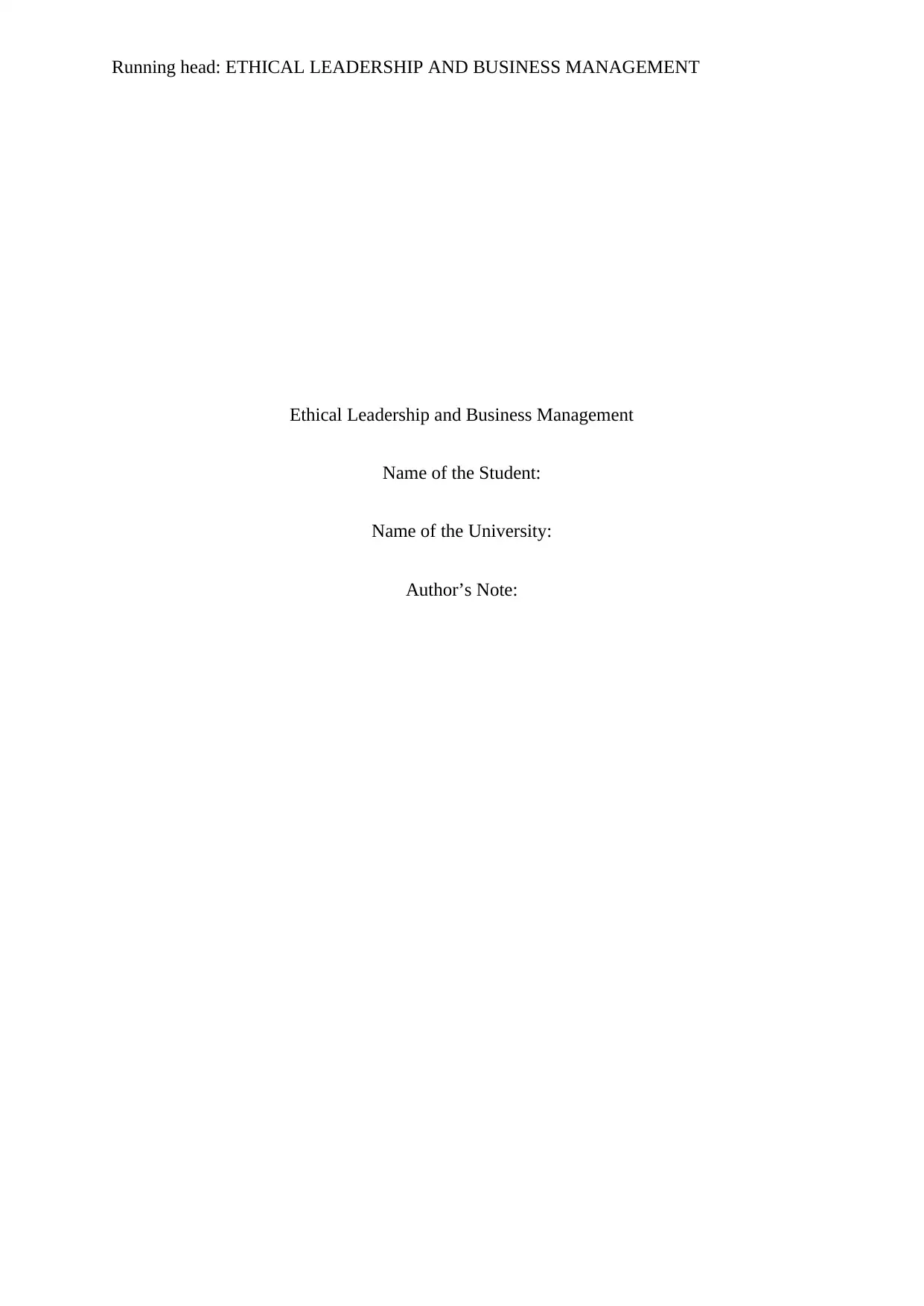
Running head: ETHICAL LEADERSHIP AND BUSINESS MANAGEMENT
Ethical Leadership and Business Management
Name of the Student:
Name of the University:
Author’s Note:
Ethical Leadership and Business Management
Name of the Student:
Name of the University:
Author’s Note:
Paraphrase This Document
Need a fresh take? Get an instant paraphrase of this document with our AI Paraphraser
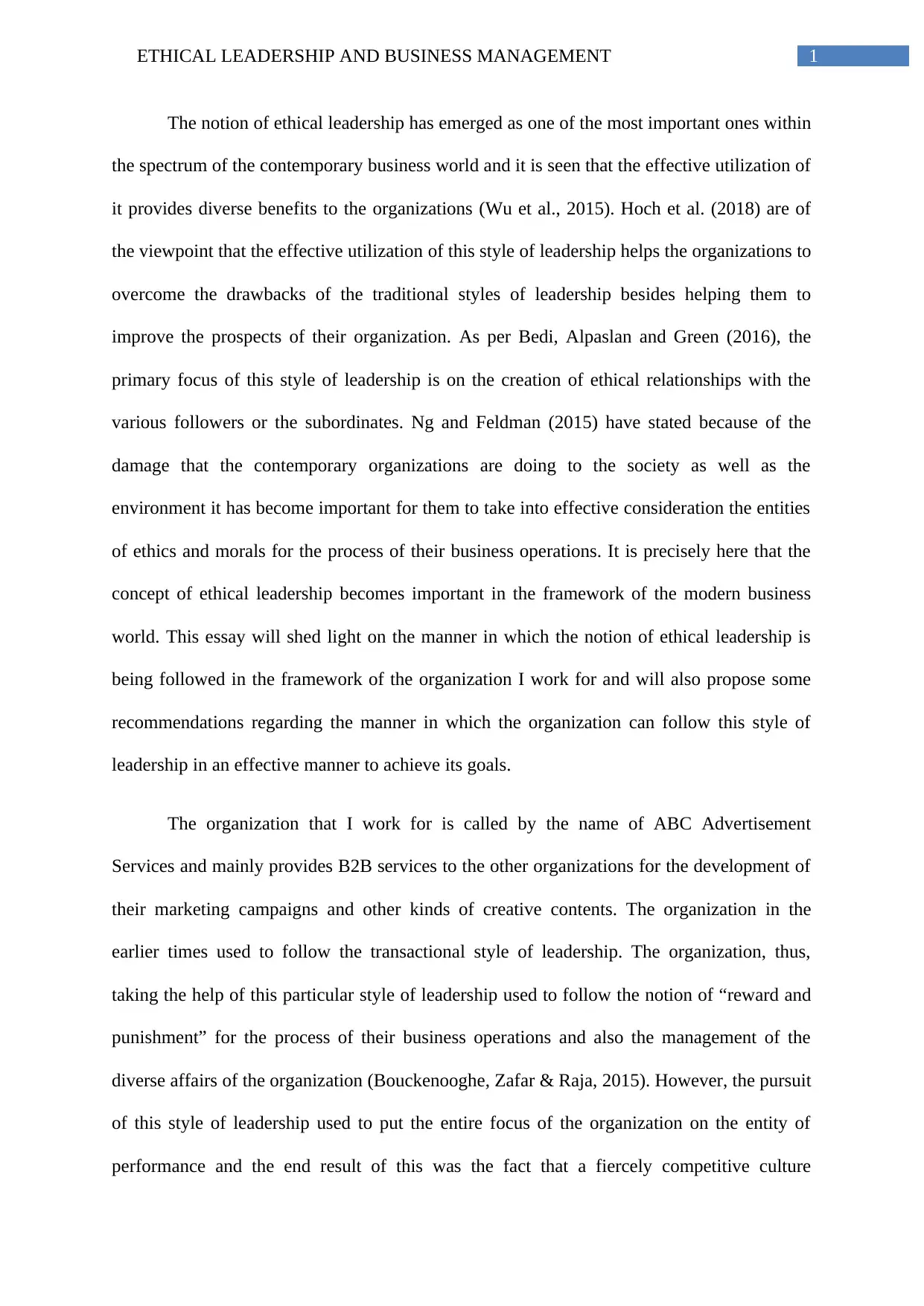
1ETHICAL LEADERSHIP AND BUSINESS MANAGEMENT
The notion of ethical leadership has emerged as one of the most important ones within
the spectrum of the contemporary business world and it is seen that the effective utilization of
it provides diverse benefits to the organizations (Wu et al., 2015). Hoch et al. (2018) are of
the viewpoint that the effective utilization of this style of leadership helps the organizations to
overcome the drawbacks of the traditional styles of leadership besides helping them to
improve the prospects of their organization. As per Bedi, Alpaslan and Green (2016), the
primary focus of this style of leadership is on the creation of ethical relationships with the
various followers or the subordinates. Ng and Feldman (2015) have stated because of the
damage that the contemporary organizations are doing to the society as well as the
environment it has become important for them to take into effective consideration the entities
of ethics and morals for the process of their business operations. It is precisely here that the
concept of ethical leadership becomes important in the framework of the modern business
world. This essay will shed light on the manner in which the notion of ethical leadership is
being followed in the framework of the organization I work for and will also propose some
recommendations regarding the manner in which the organization can follow this style of
leadership in an effective manner to achieve its goals.
The organization that I work for is called by the name of ABC Advertisement
Services and mainly provides B2B services to the other organizations for the development of
their marketing campaigns and other kinds of creative contents. The organization in the
earlier times used to follow the transactional style of leadership. The organization, thus,
taking the help of this particular style of leadership used to follow the notion of “reward and
punishment” for the process of their business operations and also the management of the
diverse affairs of the organization (Bouckenooghe, Zafar & Raja, 2015). However, the pursuit
of this style of leadership used to put the entire focus of the organization on the entity of
performance and the end result of this was the fact that a fiercely competitive culture
The notion of ethical leadership has emerged as one of the most important ones within
the spectrum of the contemporary business world and it is seen that the effective utilization of
it provides diverse benefits to the organizations (Wu et al., 2015). Hoch et al. (2018) are of
the viewpoint that the effective utilization of this style of leadership helps the organizations to
overcome the drawbacks of the traditional styles of leadership besides helping them to
improve the prospects of their organization. As per Bedi, Alpaslan and Green (2016), the
primary focus of this style of leadership is on the creation of ethical relationships with the
various followers or the subordinates. Ng and Feldman (2015) have stated because of the
damage that the contemporary organizations are doing to the society as well as the
environment it has become important for them to take into effective consideration the entities
of ethics and morals for the process of their business operations. It is precisely here that the
concept of ethical leadership becomes important in the framework of the modern business
world. This essay will shed light on the manner in which the notion of ethical leadership is
being followed in the framework of the organization I work for and will also propose some
recommendations regarding the manner in which the organization can follow this style of
leadership in an effective manner to achieve its goals.
The organization that I work for is called by the name of ABC Advertisement
Services and mainly provides B2B services to the other organizations for the development of
their marketing campaigns and other kinds of creative contents. The organization in the
earlier times used to follow the transactional style of leadership. The organization, thus,
taking the help of this particular style of leadership used to follow the notion of “reward and
punishment” for the process of their business operations and also the management of the
diverse affairs of the organization (Bouckenooghe, Zafar & Raja, 2015). However, the pursuit
of this style of leadership used to put the entire focus of the organization on the entity of
performance and the end result of this was the fact that a fiercely competitive culture
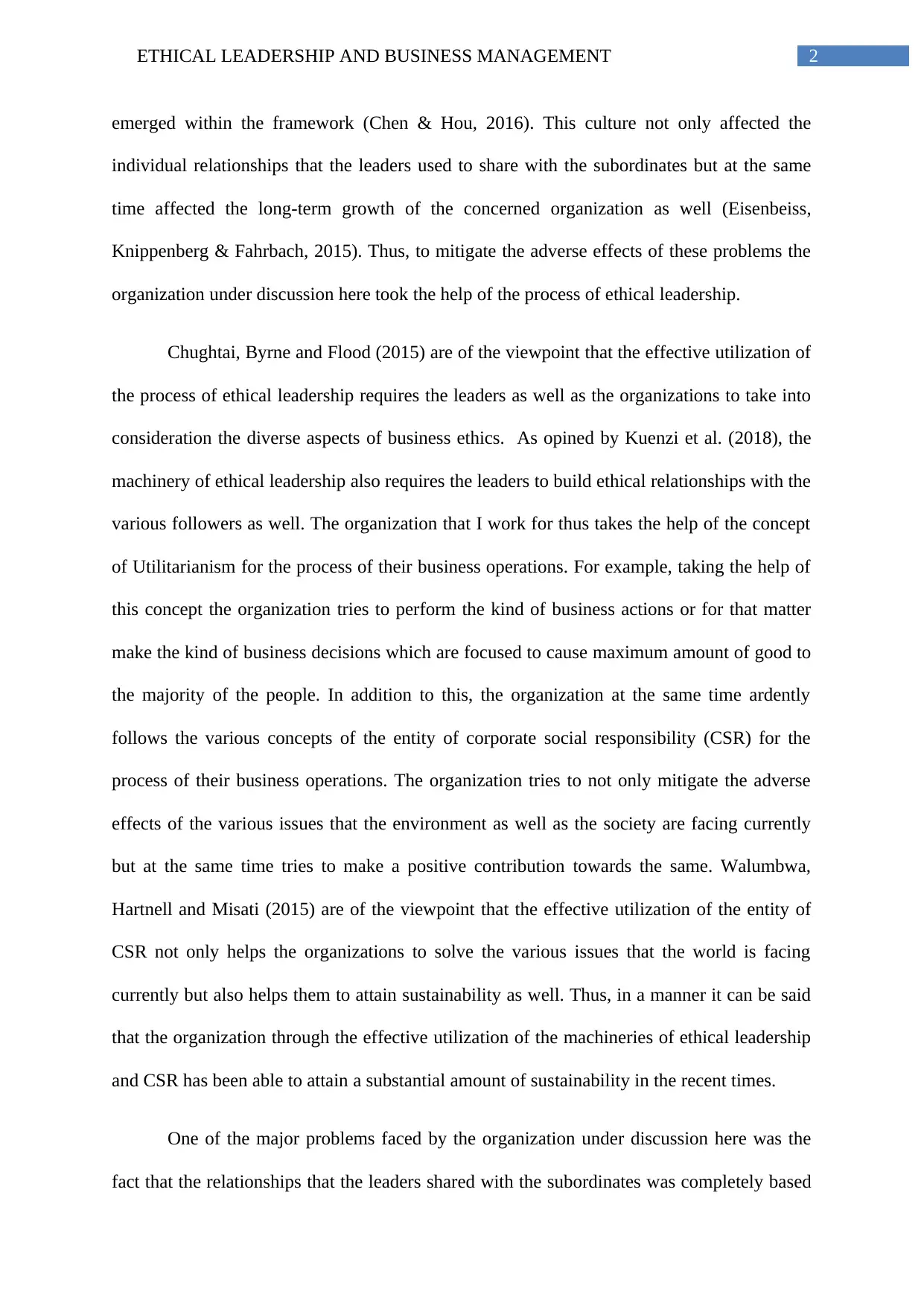
2ETHICAL LEADERSHIP AND BUSINESS MANAGEMENT
emerged within the framework (Chen & Hou, 2016). This culture not only affected the
individual relationships that the leaders used to share with the subordinates but at the same
time affected the long-term growth of the concerned organization as well (Eisenbeiss,
Knippenberg & Fahrbach, 2015). Thus, to mitigate the adverse effects of these problems the
organization under discussion here took the help of the process of ethical leadership.
Chughtai, Byrne and Flood (2015) are of the viewpoint that the effective utilization of
the process of ethical leadership requires the leaders as well as the organizations to take into
consideration the diverse aspects of business ethics. As opined by Kuenzi et al. (2018), the
machinery of ethical leadership also requires the leaders to build ethical relationships with the
various followers as well. The organization that I work for thus takes the help of the concept
of Utilitarianism for the process of their business operations. For example, taking the help of
this concept the organization tries to perform the kind of business actions or for that matter
make the kind of business decisions which are focused to cause maximum amount of good to
the majority of the people. In addition to this, the organization at the same time ardently
follows the various concepts of the entity of corporate social responsibility (CSR) for the
process of their business operations. The organization tries to not only mitigate the adverse
effects of the various issues that the environment as well as the society are facing currently
but at the same time tries to make a positive contribution towards the same. Walumbwa,
Hartnell and Misati (2015) are of the viewpoint that the effective utilization of the entity of
CSR not only helps the organizations to solve the various issues that the world is facing
currently but also helps them to attain sustainability as well. Thus, in a manner it can be said
that the organization through the effective utilization of the machineries of ethical leadership
and CSR has been able to attain a substantial amount of sustainability in the recent times.
One of the major problems faced by the organization under discussion here was the
fact that the relationships that the leaders shared with the subordinates was completely based
emerged within the framework (Chen & Hou, 2016). This culture not only affected the
individual relationships that the leaders used to share with the subordinates but at the same
time affected the long-term growth of the concerned organization as well (Eisenbeiss,
Knippenberg & Fahrbach, 2015). Thus, to mitigate the adverse effects of these problems the
organization under discussion here took the help of the process of ethical leadership.
Chughtai, Byrne and Flood (2015) are of the viewpoint that the effective utilization of
the process of ethical leadership requires the leaders as well as the organizations to take into
consideration the diverse aspects of business ethics. As opined by Kuenzi et al. (2018), the
machinery of ethical leadership also requires the leaders to build ethical relationships with the
various followers as well. The organization that I work for thus takes the help of the concept
of Utilitarianism for the process of their business operations. For example, taking the help of
this concept the organization tries to perform the kind of business actions or for that matter
make the kind of business decisions which are focused to cause maximum amount of good to
the majority of the people. In addition to this, the organization at the same time ardently
follows the various concepts of the entity of corporate social responsibility (CSR) for the
process of their business operations. The organization tries to not only mitigate the adverse
effects of the various issues that the environment as well as the society are facing currently
but at the same time tries to make a positive contribution towards the same. Walumbwa,
Hartnell and Misati (2015) are of the viewpoint that the effective utilization of the entity of
CSR not only helps the organizations to solve the various issues that the world is facing
currently but also helps them to attain sustainability as well. Thus, in a manner it can be said
that the organization through the effective utilization of the machineries of ethical leadership
and CSR has been able to attain a substantial amount of sustainability in the recent times.
One of the major problems faced by the organization under discussion here was the
fact that the relationships that the leaders shared with the subordinates was completely based
⊘ This is a preview!⊘
Do you want full access?
Subscribe today to unlock all pages.

Trusted by 1+ million students worldwide
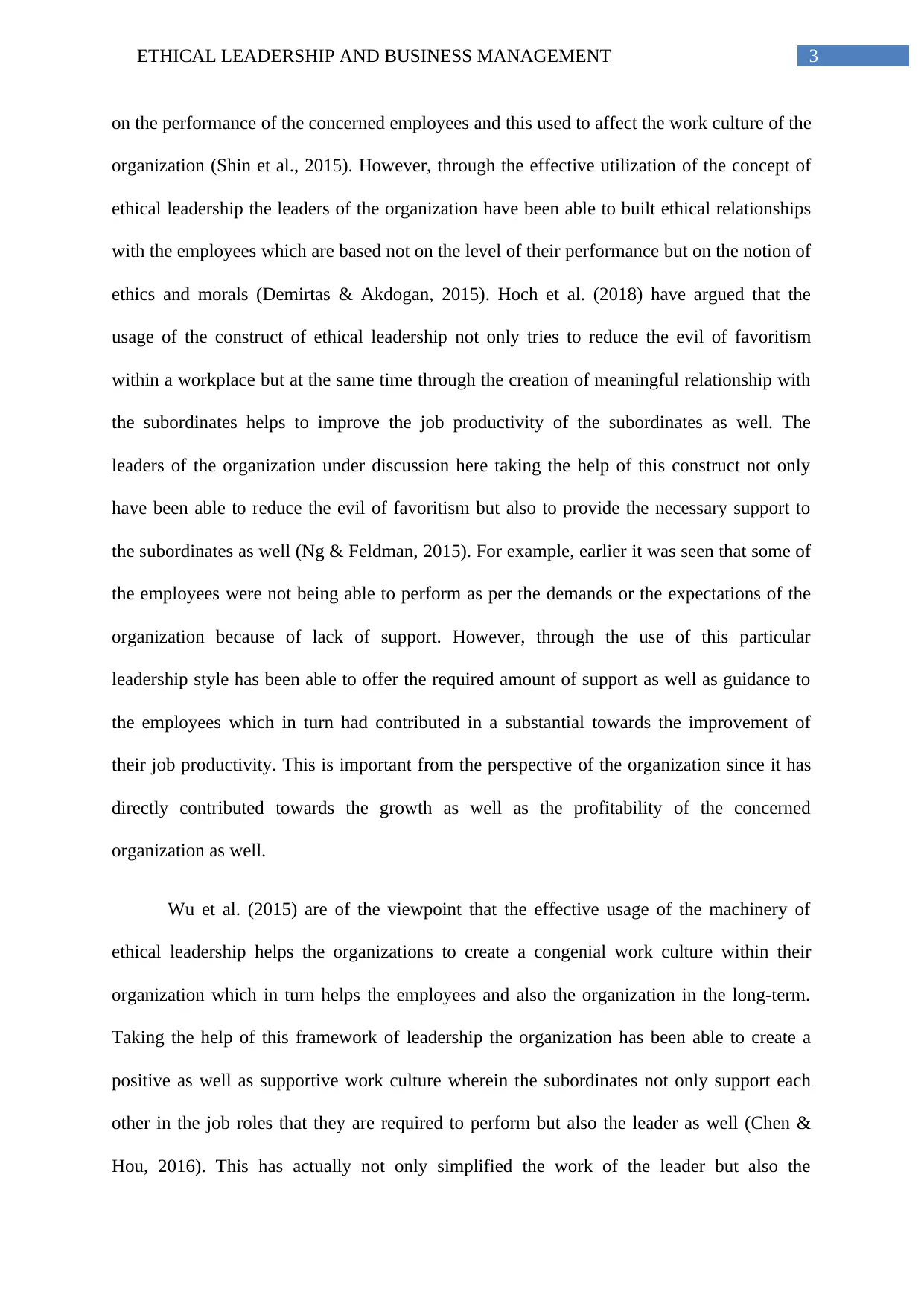
3ETHICAL LEADERSHIP AND BUSINESS MANAGEMENT
on the performance of the concerned employees and this used to affect the work culture of the
organization (Shin et al., 2015). However, through the effective utilization of the concept of
ethical leadership the leaders of the organization have been able to built ethical relationships
with the employees which are based not on the level of their performance but on the notion of
ethics and morals (Demirtas & Akdogan, 2015). Hoch et al. (2018) have argued that the
usage of the construct of ethical leadership not only tries to reduce the evil of favoritism
within a workplace but at the same time through the creation of meaningful relationship with
the subordinates helps to improve the job productivity of the subordinates as well. The
leaders of the organization under discussion here taking the help of this construct not only
have been able to reduce the evil of favoritism but also to provide the necessary support to
the subordinates as well (Ng & Feldman, 2015). For example, earlier it was seen that some of
the employees were not being able to perform as per the demands or the expectations of the
organization because of lack of support. However, through the use of this particular
leadership style has been able to offer the required amount of support as well as guidance to
the employees which in turn had contributed in a substantial towards the improvement of
their job productivity. This is important from the perspective of the organization since it has
directly contributed towards the growth as well as the profitability of the concerned
organization as well.
Wu et al. (2015) are of the viewpoint that the effective usage of the machinery of
ethical leadership helps the organizations to create a congenial work culture within their
organization which in turn helps the employees and also the organization in the long-term.
Taking the help of this framework of leadership the organization has been able to create a
positive as well as supportive work culture wherein the subordinates not only support each
other in the job roles that they are required to perform but also the leader as well (Chen &
Hou, 2016). This has actually not only simplified the work of the leader but also the
on the performance of the concerned employees and this used to affect the work culture of the
organization (Shin et al., 2015). However, through the effective utilization of the concept of
ethical leadership the leaders of the organization have been able to built ethical relationships
with the employees which are based not on the level of their performance but on the notion of
ethics and morals (Demirtas & Akdogan, 2015). Hoch et al. (2018) have argued that the
usage of the construct of ethical leadership not only tries to reduce the evil of favoritism
within a workplace but at the same time through the creation of meaningful relationship with
the subordinates helps to improve the job productivity of the subordinates as well. The
leaders of the organization under discussion here taking the help of this construct not only
have been able to reduce the evil of favoritism but also to provide the necessary support to
the subordinates as well (Ng & Feldman, 2015). For example, earlier it was seen that some of
the employees were not being able to perform as per the demands or the expectations of the
organization because of lack of support. However, through the use of this particular
leadership style has been able to offer the required amount of support as well as guidance to
the employees which in turn had contributed in a substantial towards the improvement of
their job productivity. This is important from the perspective of the organization since it has
directly contributed towards the growth as well as the profitability of the concerned
organization as well.
Wu et al. (2015) are of the viewpoint that the effective usage of the machinery of
ethical leadership helps the organizations to create a congenial work culture within their
organization which in turn helps the employees and also the organization in the long-term.
Taking the help of this framework of leadership the organization has been able to create a
positive as well as supportive work culture wherein the subordinates not only support each
other in the job roles that they are required to perform but also the leader as well (Chen &
Hou, 2016). This has actually not only simplified the work of the leader but also the
Paraphrase This Document
Need a fresh take? Get an instant paraphrase of this document with our AI Paraphraser
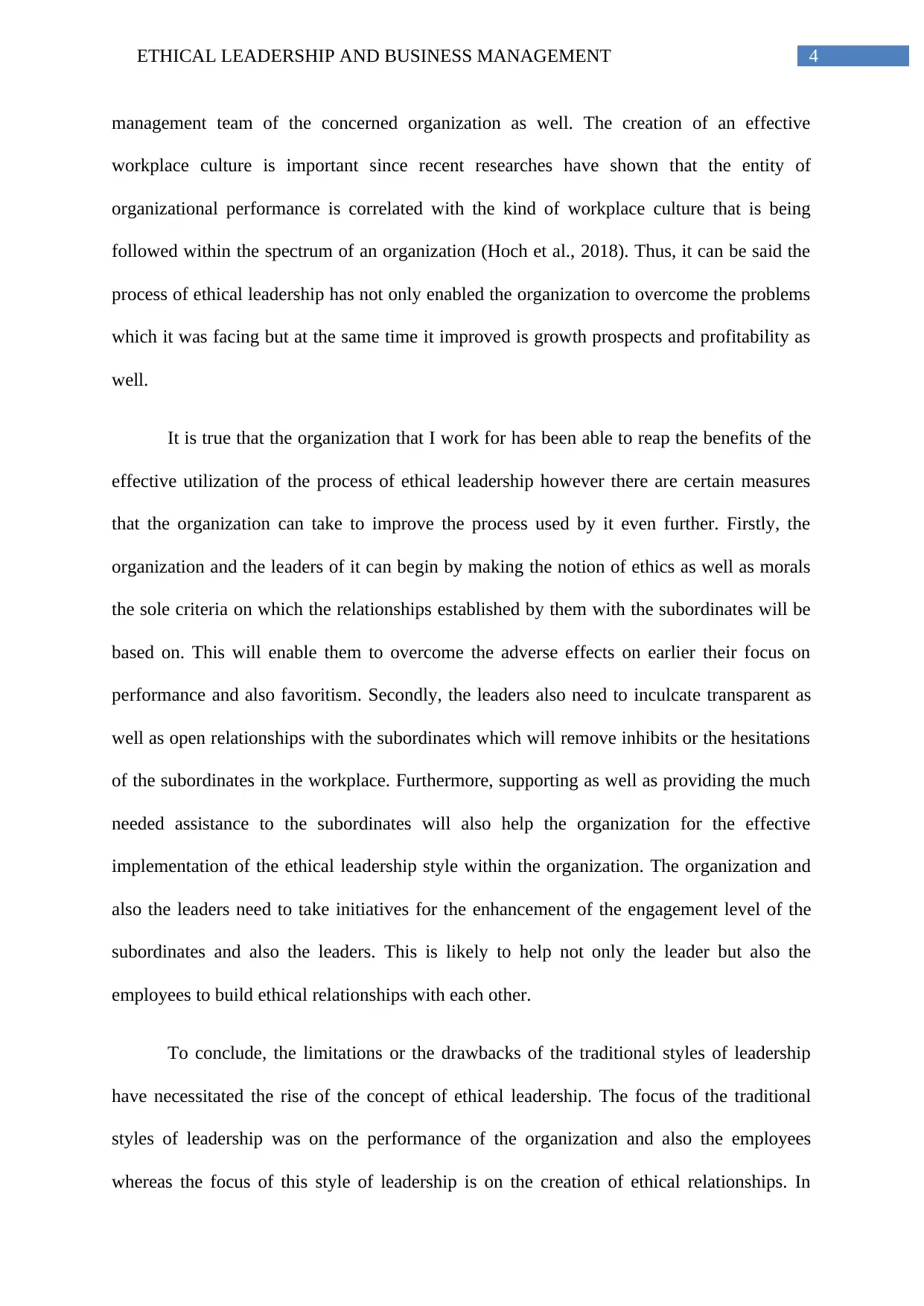
4ETHICAL LEADERSHIP AND BUSINESS MANAGEMENT
management team of the concerned organization as well. The creation of an effective
workplace culture is important since recent researches have shown that the entity of
organizational performance is correlated with the kind of workplace culture that is being
followed within the spectrum of an organization (Hoch et al., 2018). Thus, it can be said the
process of ethical leadership has not only enabled the organization to overcome the problems
which it was facing but at the same time it improved is growth prospects and profitability as
well.
It is true that the organization that I work for has been able to reap the benefits of the
effective utilization of the process of ethical leadership however there are certain measures
that the organization can take to improve the process used by it even further. Firstly, the
organization and the leaders of it can begin by making the notion of ethics as well as morals
the sole criteria on which the relationships established by them with the subordinates will be
based on. This will enable them to overcome the adverse effects on earlier their focus on
performance and also favoritism. Secondly, the leaders also need to inculcate transparent as
well as open relationships with the subordinates which will remove inhibits or the hesitations
of the subordinates in the workplace. Furthermore, supporting as well as providing the much
needed assistance to the subordinates will also help the organization for the effective
implementation of the ethical leadership style within the organization. The organization and
also the leaders need to take initiatives for the enhancement of the engagement level of the
subordinates and also the leaders. This is likely to help not only the leader but also the
employees to build ethical relationships with each other.
To conclude, the limitations or the drawbacks of the traditional styles of leadership
have necessitated the rise of the concept of ethical leadership. The focus of the traditional
styles of leadership was on the performance of the organization and also the employees
whereas the focus of this style of leadership is on the creation of ethical relationships. In
management team of the concerned organization as well. The creation of an effective
workplace culture is important since recent researches have shown that the entity of
organizational performance is correlated with the kind of workplace culture that is being
followed within the spectrum of an organization (Hoch et al., 2018). Thus, it can be said the
process of ethical leadership has not only enabled the organization to overcome the problems
which it was facing but at the same time it improved is growth prospects and profitability as
well.
It is true that the organization that I work for has been able to reap the benefits of the
effective utilization of the process of ethical leadership however there are certain measures
that the organization can take to improve the process used by it even further. Firstly, the
organization and the leaders of it can begin by making the notion of ethics as well as morals
the sole criteria on which the relationships established by them with the subordinates will be
based on. This will enable them to overcome the adverse effects on earlier their focus on
performance and also favoritism. Secondly, the leaders also need to inculcate transparent as
well as open relationships with the subordinates which will remove inhibits or the hesitations
of the subordinates in the workplace. Furthermore, supporting as well as providing the much
needed assistance to the subordinates will also help the organization for the effective
implementation of the ethical leadership style within the organization. The organization and
also the leaders need to take initiatives for the enhancement of the engagement level of the
subordinates and also the leaders. This is likely to help not only the leader but also the
employees to build ethical relationships with each other.
To conclude, the limitations or the drawbacks of the traditional styles of leadership
have necessitated the rise of the concept of ethical leadership. The focus of the traditional
styles of leadership was on the performance of the organization and also the employees
whereas the focus of this style of leadership is on the creation of ethical relationships. In
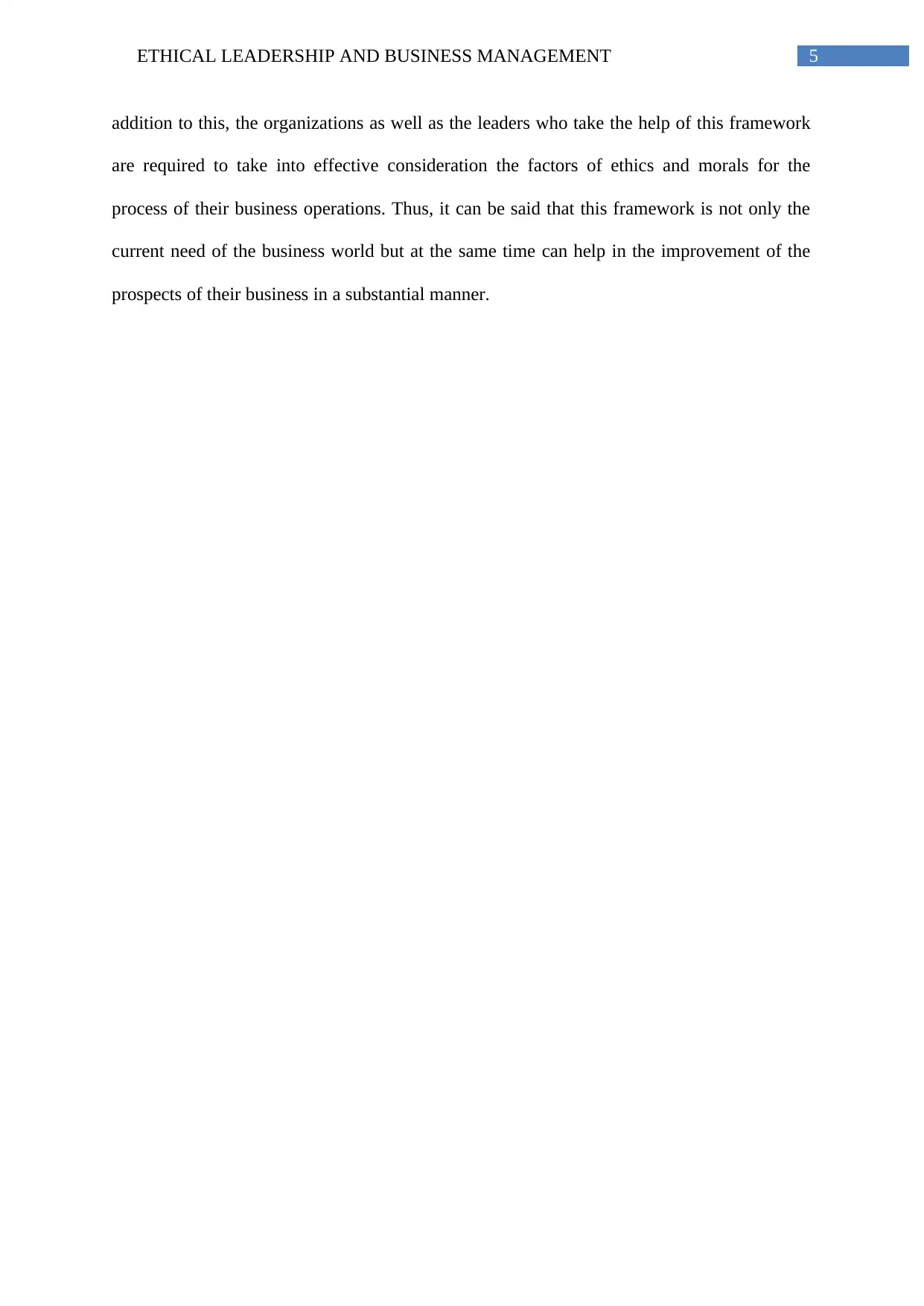
5ETHICAL LEADERSHIP AND BUSINESS MANAGEMENT
addition to this, the organizations as well as the leaders who take the help of this framework
are required to take into effective consideration the factors of ethics and morals for the
process of their business operations. Thus, it can be said that this framework is not only the
current need of the business world but at the same time can help in the improvement of the
prospects of their business in a substantial manner.
addition to this, the organizations as well as the leaders who take the help of this framework
are required to take into effective consideration the factors of ethics and morals for the
process of their business operations. Thus, it can be said that this framework is not only the
current need of the business world but at the same time can help in the improvement of the
prospects of their business in a substantial manner.
⊘ This is a preview!⊘
Do you want full access?
Subscribe today to unlock all pages.

Trusted by 1+ million students worldwide
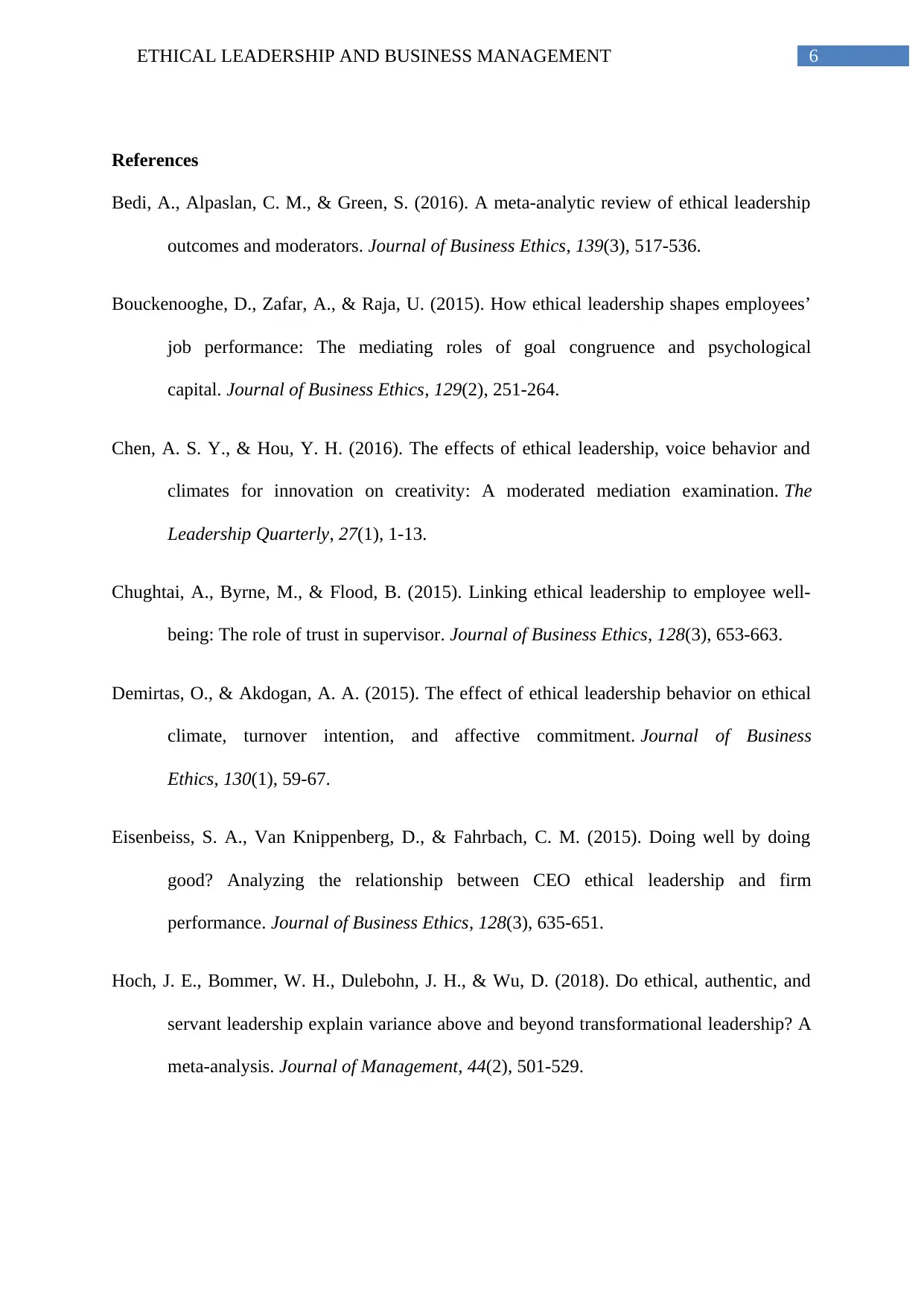
6ETHICAL LEADERSHIP AND BUSINESS MANAGEMENT
References
Bedi, A., Alpaslan, C. M., & Green, S. (2016). A meta-analytic review of ethical leadership
outcomes and moderators. Journal of Business Ethics, 139(3), 517-536.
Bouckenooghe, D., Zafar, A., & Raja, U. (2015). How ethical leadership shapes employees’
job performance: The mediating roles of goal congruence and psychological
capital. Journal of Business Ethics, 129(2), 251-264.
Chen, A. S. Y., & Hou, Y. H. (2016). The effects of ethical leadership, voice behavior and
climates for innovation on creativity: A moderated mediation examination. The
Leadership Quarterly, 27(1), 1-13.
Chughtai, A., Byrne, M., & Flood, B. (2015). Linking ethical leadership to employee well-
being: The role of trust in supervisor. Journal of Business Ethics, 128(3), 653-663.
Demirtas, O., & Akdogan, A. A. (2015). The effect of ethical leadership behavior on ethical
climate, turnover intention, and affective commitment. Journal of Business
Ethics, 130(1), 59-67.
Eisenbeiss, S. A., Van Knippenberg, D., & Fahrbach, C. M. (2015). Doing well by doing
good? Analyzing the relationship between CEO ethical leadership and firm
performance. Journal of Business Ethics, 128(3), 635-651.
Hoch, J. E., Bommer, W. H., Dulebohn, J. H., & Wu, D. (2018). Do ethical, authentic, and
servant leadership explain variance above and beyond transformational leadership? A
meta-analysis. Journal of Management, 44(2), 501-529.
References
Bedi, A., Alpaslan, C. M., & Green, S. (2016). A meta-analytic review of ethical leadership
outcomes and moderators. Journal of Business Ethics, 139(3), 517-536.
Bouckenooghe, D., Zafar, A., & Raja, U. (2015). How ethical leadership shapes employees’
job performance: The mediating roles of goal congruence and psychological
capital. Journal of Business Ethics, 129(2), 251-264.
Chen, A. S. Y., & Hou, Y. H. (2016). The effects of ethical leadership, voice behavior and
climates for innovation on creativity: A moderated mediation examination. The
Leadership Quarterly, 27(1), 1-13.
Chughtai, A., Byrne, M., & Flood, B. (2015). Linking ethical leadership to employee well-
being: The role of trust in supervisor. Journal of Business Ethics, 128(3), 653-663.
Demirtas, O., & Akdogan, A. A. (2015). The effect of ethical leadership behavior on ethical
climate, turnover intention, and affective commitment. Journal of Business
Ethics, 130(1), 59-67.
Eisenbeiss, S. A., Van Knippenberg, D., & Fahrbach, C. M. (2015). Doing well by doing
good? Analyzing the relationship between CEO ethical leadership and firm
performance. Journal of Business Ethics, 128(3), 635-651.
Hoch, J. E., Bommer, W. H., Dulebohn, J. H., & Wu, D. (2018). Do ethical, authentic, and
servant leadership explain variance above and beyond transformational leadership? A
meta-analysis. Journal of Management, 44(2), 501-529.
Paraphrase This Document
Need a fresh take? Get an instant paraphrase of this document with our AI Paraphraser
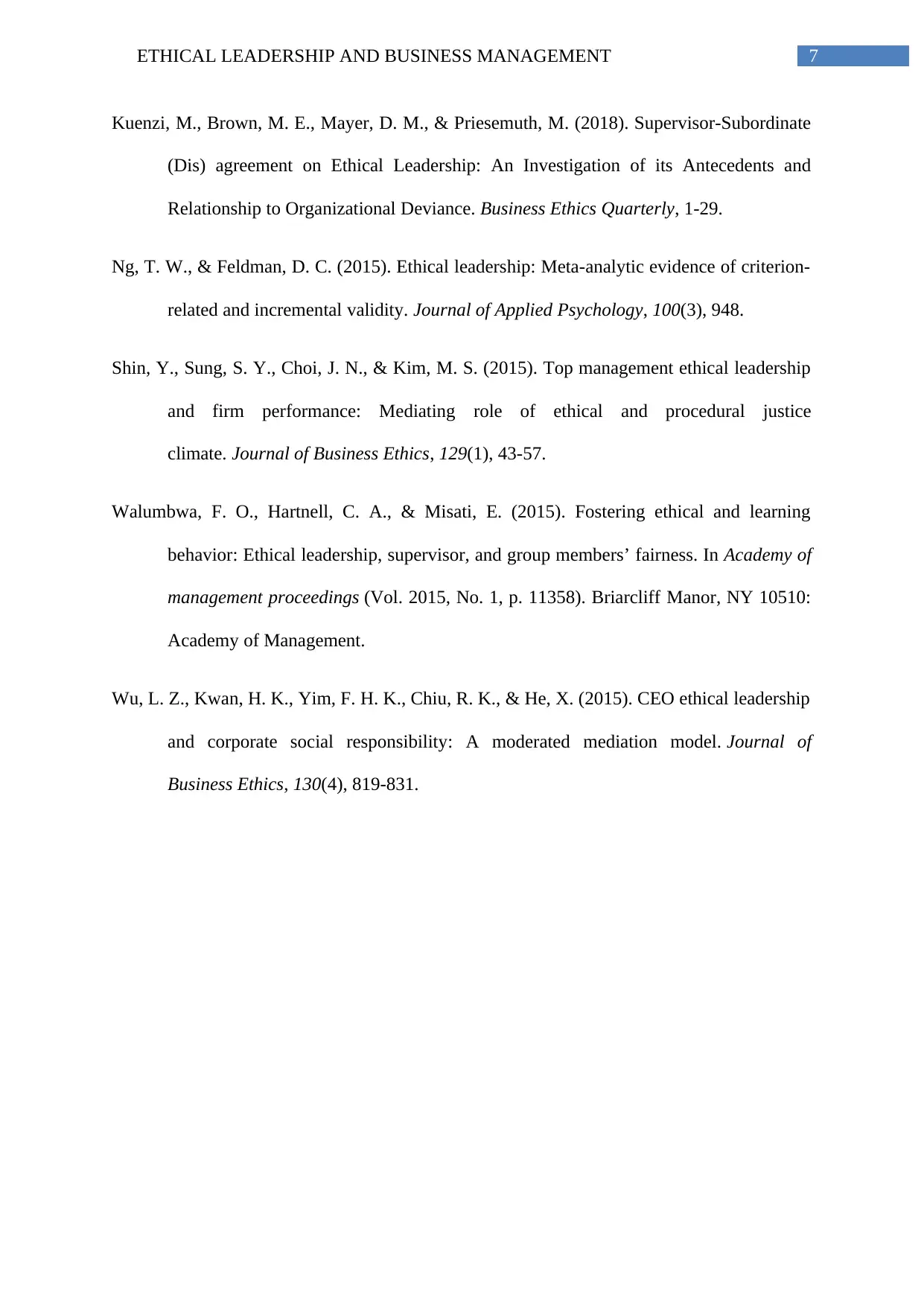
7ETHICAL LEADERSHIP AND BUSINESS MANAGEMENT
Kuenzi, M., Brown, M. E., Mayer, D. M., & Priesemuth, M. (2018). Supervisor-Subordinate
(Dis) agreement on Ethical Leadership: An Investigation of its Antecedents and
Relationship to Organizational Deviance. Business Ethics Quarterly, 1-29.
Ng, T. W., & Feldman, D. C. (2015). Ethical leadership: Meta-analytic evidence of criterion-
related and incremental validity. Journal of Applied Psychology, 100(3), 948.
Shin, Y., Sung, S. Y., Choi, J. N., & Kim, M. S. (2015). Top management ethical leadership
and firm performance: Mediating role of ethical and procedural justice
climate. Journal of Business Ethics, 129(1), 43-57.
Walumbwa, F. O., Hartnell, C. A., & Misati, E. (2015). Fostering ethical and learning
behavior: Ethical leadership, supervisor, and group members’ fairness. In Academy of
management proceedings (Vol. 2015, No. 1, p. 11358). Briarcliff Manor, NY 10510:
Academy of Management.
Wu, L. Z., Kwan, H. K., Yim, F. H. K., Chiu, R. K., & He, X. (2015). CEO ethical leadership
and corporate social responsibility: A moderated mediation model. Journal of
Business Ethics, 130(4), 819-831.
Kuenzi, M., Brown, M. E., Mayer, D. M., & Priesemuth, M. (2018). Supervisor-Subordinate
(Dis) agreement on Ethical Leadership: An Investigation of its Antecedents and
Relationship to Organizational Deviance. Business Ethics Quarterly, 1-29.
Ng, T. W., & Feldman, D. C. (2015). Ethical leadership: Meta-analytic evidence of criterion-
related and incremental validity. Journal of Applied Psychology, 100(3), 948.
Shin, Y., Sung, S. Y., Choi, J. N., & Kim, M. S. (2015). Top management ethical leadership
and firm performance: Mediating role of ethical and procedural justice
climate. Journal of Business Ethics, 129(1), 43-57.
Walumbwa, F. O., Hartnell, C. A., & Misati, E. (2015). Fostering ethical and learning
behavior: Ethical leadership, supervisor, and group members’ fairness. In Academy of
management proceedings (Vol. 2015, No. 1, p. 11358). Briarcliff Manor, NY 10510:
Academy of Management.
Wu, L. Z., Kwan, H. K., Yim, F. H. K., Chiu, R. K., & He, X. (2015). CEO ethical leadership
and corporate social responsibility: A moderated mediation model. Journal of
Business Ethics, 130(4), 819-831.
1 out of 8
Related Documents
Your All-in-One AI-Powered Toolkit for Academic Success.
+13062052269
info@desklib.com
Available 24*7 on WhatsApp / Email
![[object Object]](/_next/static/media/star-bottom.7253800d.svg)
Unlock your academic potential
Copyright © 2020–2025 A2Z Services. All Rights Reserved. Developed and managed by ZUCOL.





